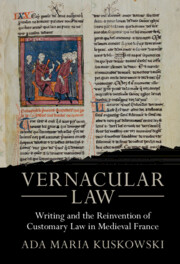Book contents
- Vernacular Law
- Studies In Legal History
- Vernacular Law
- Copyright page
- Dedication
- Contents
- Figures
- Acknowledgments
- A Note on the Text
- Introduction Vernacular Writing and the Transformation of Customary Law in Medieval France
- Part I Written Custom and the Formation of Vernacular Law
- 1 What Is Custom? Concept and Literary Practice
- 2 Composing Customary Law as a Vernacular Law
- 3 Writing a ‘ius non scriptum’: Writtenness, Memory, and Change
- Part II Political and Intellectual Tensions
- Part III Implications
- Conclusion Lasting Model and Professional Community
- Bibliography
- Index
1 - What Is Custom? Concept and Literary Practice
from Part I - Written Custom and the Formation of Vernacular Law
Published online by Cambridge University Press: 27 October 2022
- Vernacular Law
- Studies In Legal History
- Vernacular Law
- Copyright page
- Dedication
- Contents
- Figures
- Acknowledgments
- A Note on the Text
- Introduction Vernacular Writing and the Transformation of Customary Law in Medieval France
- Part I Written Custom and the Formation of Vernacular Law
- 1 What Is Custom? Concept and Literary Practice
- 2 Composing Customary Law as a Vernacular Law
- 3 Writing a ‘ius non scriptum’: Writtenness, Memory, and Change
- Part II Political and Intellectual Tensions
- Part III Implications
- Conclusion Lasting Model and Professional Community
- Bibliography
- Index
Summary
This chapter provides a history of the idea of custom both in definitions and as presented in texts about lay legal life before the coutumiers. The first part of the chapter examines the struggle to define custom from late antiquity to the time of the coutumiers. It shows that thinking about and defining custom in its legal capacity was no obvious thing: while there where common definitional elements, the quest to define custom was marked by debate and a lack of consensus that would continue into the fourteenth century.
Keywords
- Type
- Chapter
- Information
- Vernacular LawWriting and the Reinvention of Customary Law in Medieval France, pp. 29 - 88Publisher: Cambridge University PressPrint publication year: 2022

